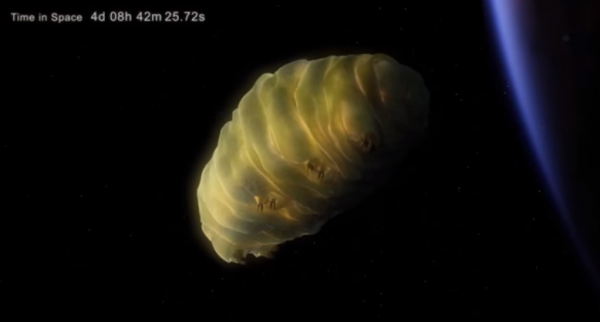By Ana Verayo, | March 18, 2017

Tardigrades are indestructible creatures that can survive in space.
The world's toughest animals are also the smallest ones that can live well below the ocean floor or the highest mountains on Earth. These "water bears" are so resilient that they can withstand 150 degrees Celsius or below freezing temperatures. In a new study, scientists identify their secret why the creatures could not die despite dangerous and harsh habitats.
Like Us on Facebook
Tardigrades are tiny, one millimeter creatures that are also known as moss piglets and water bears. They also seem to be indestructible. For example, these cute, tough creatures were brought to space at the International Space Station and found it so cozy that they mated to produce more offspring despite the pressure and micro gravity.
According to lead author of the study, Thomas Boothby from North Carolina University, tardigrades have already evolved with unique genes that even allowed them survive drying out. Apart from this, the proteins within these genes can protect other biological material like enzymes, yeast and even bacteria, from being destroyed.
These unique proteins are known as TDP or "tardigrade specific intrinsically disordered proteins". They are named after these tiny creatures that naturally evolved with these proteins. Prior research suggested that the TDP was a certain type of sugar known as trehelose that are also present in other organisms like brine shrimp. Researchers first thought that this was the secret to the tardigrade's resurrection abilities after being dried out for almost 10 years.
In this new study, Boothby was able to place these genes into bacteria and yeast where they also gained similar regenerative properties that the tardigrades possess. He says that TDPs can also be used for real world applications such as protecting crops from the effects of climate change such as drought.
With the TDPs, these can even be applied in preserving medicines without the need of a refrigerator. Boothby adds, this ability to stabilize sensitive pharmaceuticals in a dry state can become very crucial in remote areas and dry regions such as Africa.
This new study is published in the journal Molecular Cell.
-
Use of Coronavirus Pandemic Drones Raises Privacy Concerns: Drones Spread Fear, Local Officials Say

-
Coronavirus Hampers The Delivery Of Lockheed Martin F-35 Stealth Fighters For 2020

-
Instagram Speeds Up Plans to Add Account Memorialization Feature Due to COVID-19 Deaths

-
NASA: Perseverance Plans to Bring 'Mars Rock' to Earth in 2031

-
600 Dead And 3,000 In The Hospital as Iranians Believed Drinking High-Concentrations of Alcohol Can Cure The Coronavirus

-
600 Dead And 3,000 In The Hospital as Iranians Believed Drinking High-Concentrations of Alcohol Can Cure The Coronavirus

-
COVID-19: Doctors, Nurses Use Virtual Reality to Learn New Skills in Treating Coronavirus Patients







